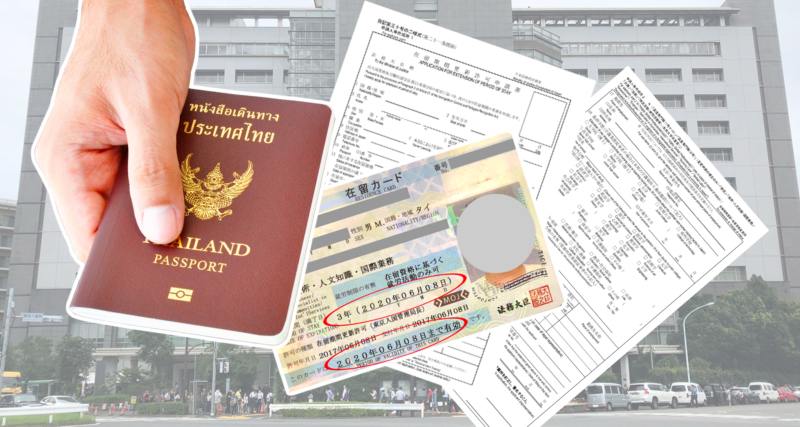Whether you want to move to Japan for study, work, or any other reason, you have to know about residence statuses. As a foreigner, you’ll need the right kind of residence status for whatever activity you plan to engage in while living mid to long-term in Japan and you may even have to change your status at some point, depending on your circumstances. That’s why, in this article, we will try to lay out all the basic facts about Japan’s immigration system.
[Latest Info as of September 2020] Japanese Government Institutions and COVID-19
The COVID-19 pandemic currently gripping the world has led to many irregular procedures at Japan’s government departments including the Immigration Services Agency of Japan. For example, when entering the Agency’s office, people are now required to undergo temperature checks, hand disinfection, and bag inspections. The Agency also limits the number of people that can enter the building at a time, which leads to congestion and to file processing taking a very long time. For this reason, if you want to file any sort of immigration document with the Bureau, we recommend you set aside most of the day for it.
What’s the Difference Between a Status of Residence, a Visa, and a Residence Card?
The Difference Between a Status of Residence and a Visa
In Japan, the terms “status of residence/residence status” (在留資格) and “visa” (ビザ) are often used interchangeably. However, technically speaking, the two are totally different. A visa is a document that a foreigner obtains prior to entering Japan at a Japanese embassy or consulate. It comes in the form of a sticker that goes inside your passport. Conversely, a status of residence is a permission to stay in Japan obtained from the Immigration Services Agency of Japan, and you get it after entering the country. Residents of some countries can enter Japan for a short period (15 – 90 days) without a visa. (Note that as of September 2020, these visa exemptions have been suspended, excluding some countries and regions.)
However, those engaged in activities in Japan for which they receive compensation, or those who’ve overstayed their short-term stay in Japan, have to obtain a visa and a status of residence. In other words, foreigners entering Japan who want to work or live mid to long-term in Japan need to obtain the right kind of visa and status of residence for that activity.
What’s a Status of Residence?
There are 29 residence statuses in Japan, each one corresponding to a specific activity. These statuses determine the scope of the activity one is permitted to engage in, or whether a person is even allowed to work in the first place. If you are coming to Japan to work, you’ll need to obtain a status of residence that matches the field of your job.
Excluding special cases like Permanent Resident or Spouse of Japanese National, a person with a Japanese status of residence cannot have an income from an activity outside the one specified by their status. In the event that that happens, they’ll need to obtain approval for this other activity or change their residence status altogether. However, all of this is done at the discretion of the Minister of Justice, without any publicly available criteria that you can look up and/or follow. That’s why it’s important to fully understand the exact scope of permitted activities, as well as the entire application process before you apply for a status of residence.
Additionally, the length of time a person is allowed to reside in Japan differs depending on the residence status, ranging from five years to three years to one year. This is decided by the Immigration Services Agency of Japan based on the applicant’s individual circumstances, and you will not be told the reasons why your period of stay was set at a certain number of years.
What’s a Residence Card?
A person who has obtained a status of residence and is staying in Japan mid to long-term (a mid to long-term resident), will receive a Residence Card. In most cases, the card will be issued to you upon your arrival in Japan at a major airport. All foreigners residing in Japan must carry this card with them at all times instead of their passports. The card is a form of valid ID so it can be used to open a bank account or make a cellphone contract.
How long a person is allowed to stay in Japan depends on their residence status. If you want to stay in the country longer, you need to apply for a renewal of your period of stay about three months before the end of the period of validity stated on the card. This has to be done as quickly as possible as you need to have a valid residence card while staying in Japan (not counting the time while your application is being processed.) Your application can even be rejected on the day that you submit it if all the necessary documents are not in order, so if you’re renewing your period of stay, it’s best to leave yourself plenty of time before the deadline.
The 29 Residence Statuses
There are a total of 29 different residence statuses in Japan. They’re based on authorized activities like “Student,” “Instructor,” “Researcher,” “Engineer/Specialist in Humanities/International Services,” or status like “Spouse of Japanese National.” Which residence status applies best to you? Look through the list and decide for yourself.
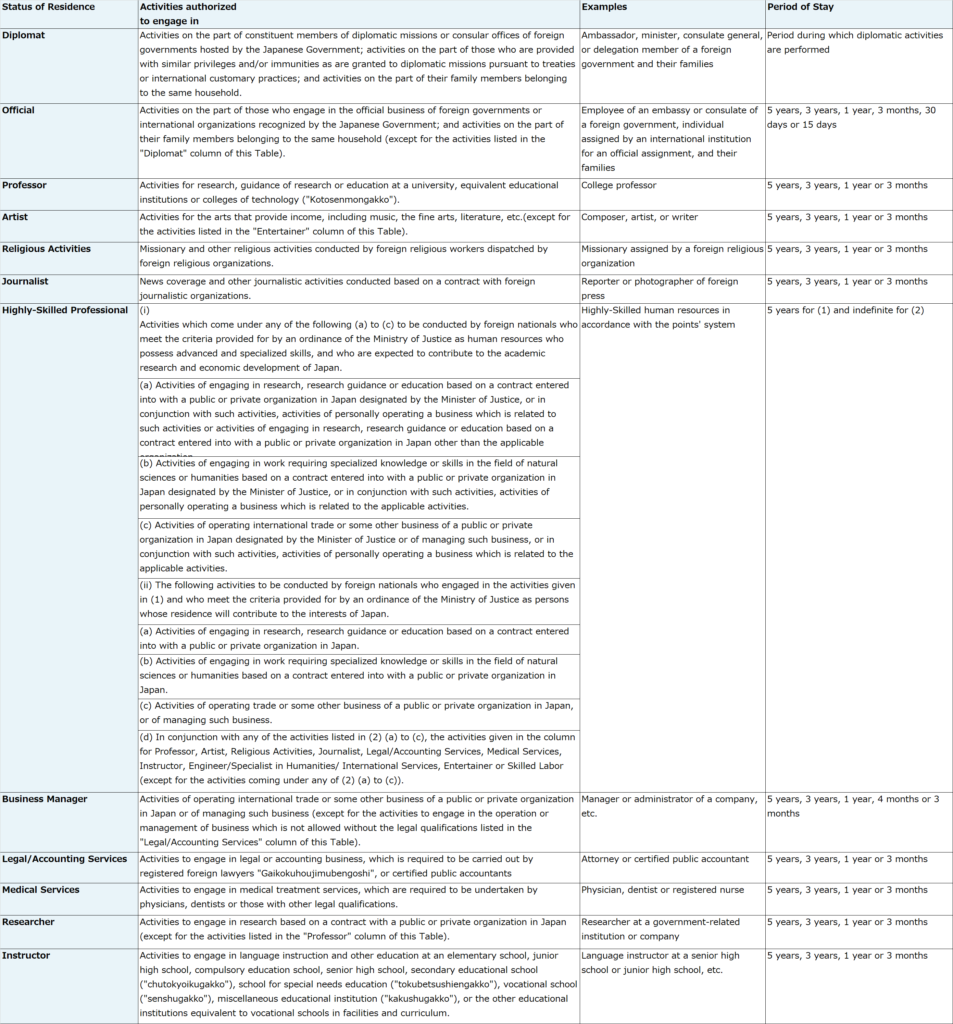
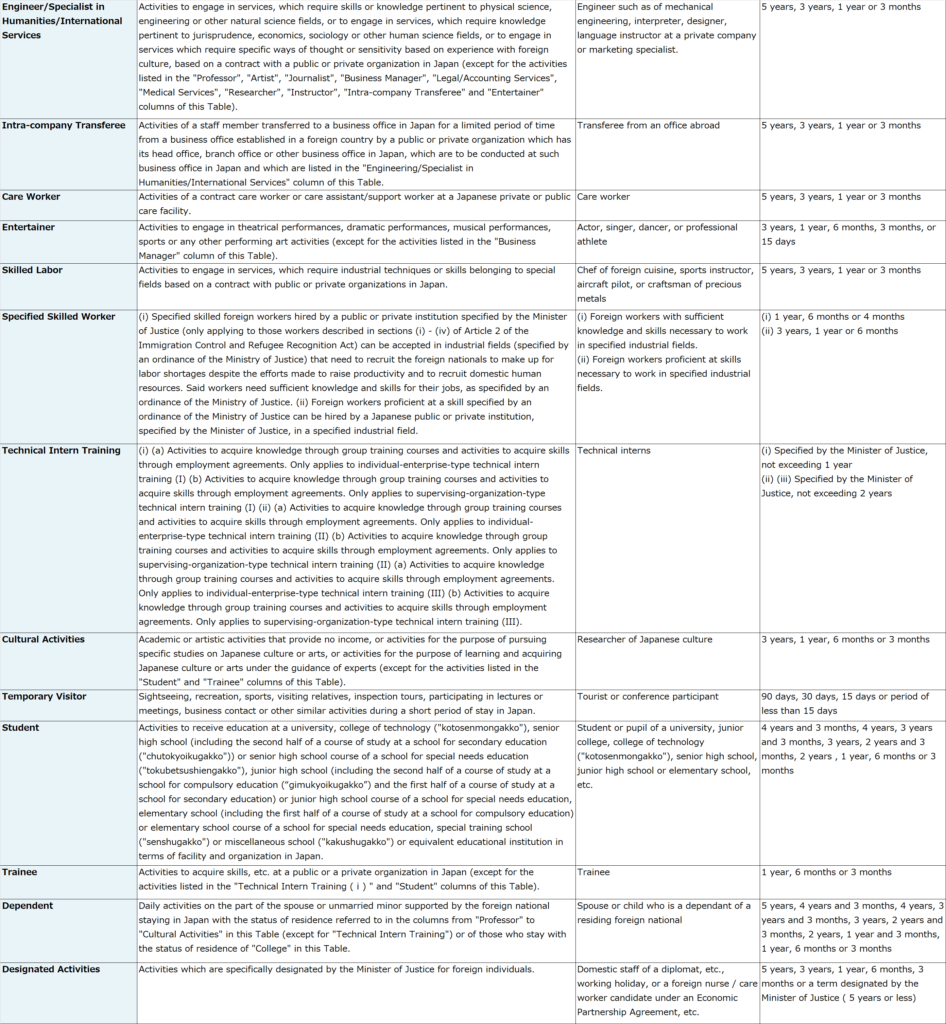
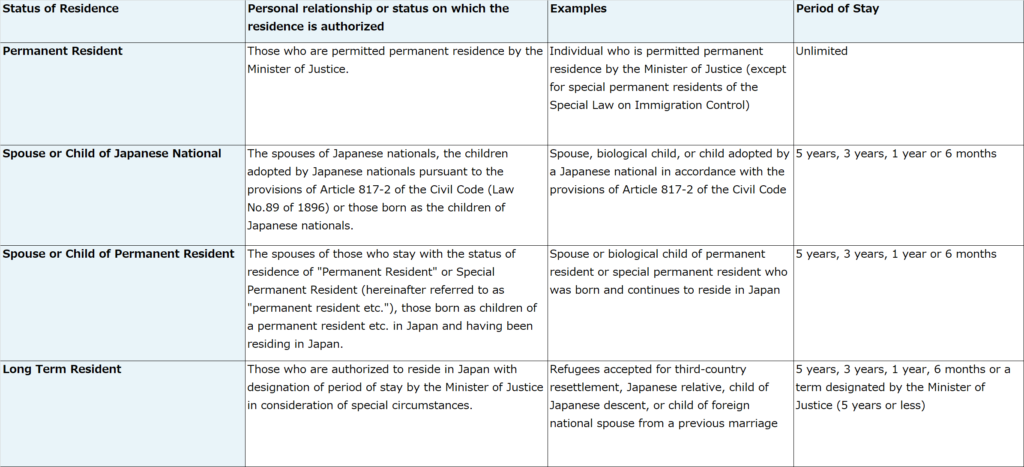
How to Apply for a Status of Residence
People who can file an application for a status of residence include the applicant himself, a representative of a company/school accepting the applicant, or an application agent. However, most applicants for a status of residence reside abroad at the time of filing, so the job is usually done by a representative at the institution they will be joining in or by a hired notary public/lawyer.
Here’s what the application process looks like:

First, a representative of a company, school, or organization taking in the foreign applicant (you) applies for a certificate of eligibility for residence status at their local Immigration Bureau. The process can take up to three months, so the application should be filed as early as possible.
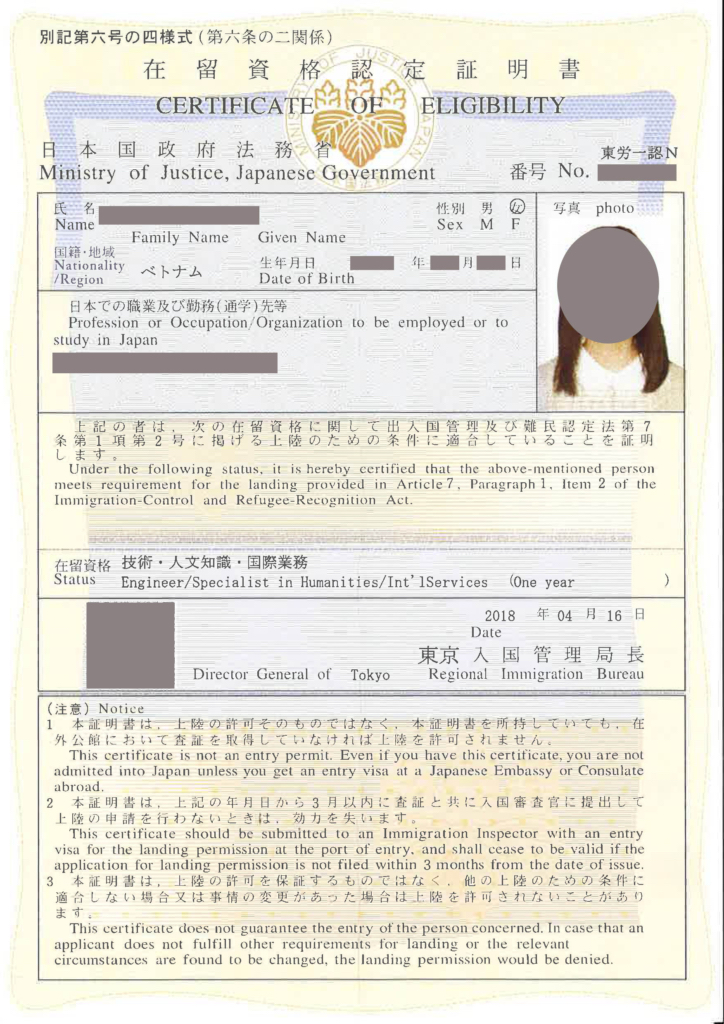
The obtained certificate of eligibility for residence status is then mailed to the foreign applicant who uses it, and their passport, to apply for a visa at their country’s Japanese embassy. Once the embassy issues the applicant a visa, the person can travel to Japan and present their passport and visa at the airport. Their passport will then be stamped with the date of their arrival and a residence card will be printed, confirming their status of residence.
In other words, the process goes this: Issuing of a certificate of eligibility for residence status –> Obtaining a visa from a Japanese embassy or consulate –> Receiving residence card at the airport’s Immigration Bureau.
The certificate of eligibility for residence status is valid for only three months (although extensions are possible now due to the COVID pandemic.) Please be careful, because this deadline isn’t just for obtaining a visa, but for arriving in Japan.
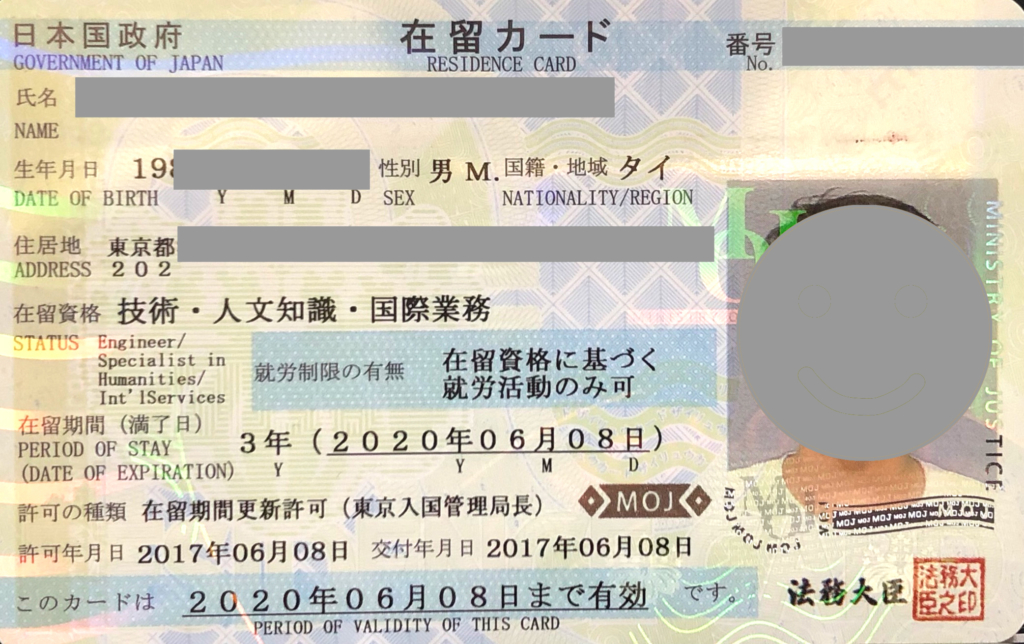
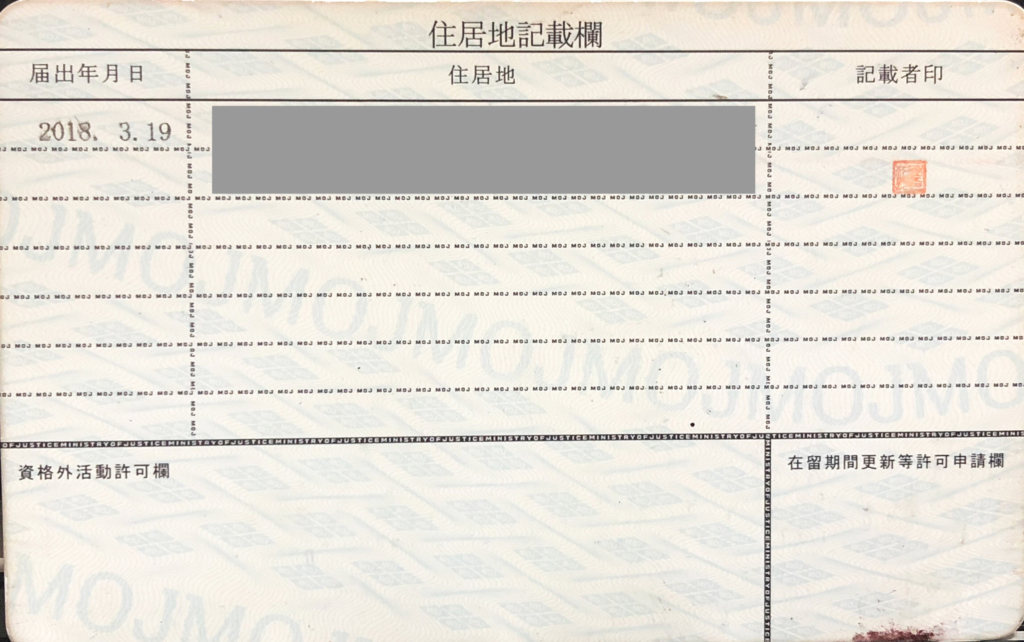
You will receive a residence card upon arriving in Japan at Narita Airport, Haneda Airport, Chubu Centrair International Airport, Kansai International Airport, New Chitose Airport, Hiroshima Airport, or Fukuoka Airport. If you arrive in Japan at any other port of entry, your residence card will be mailed to your registered address after a few days.
The documents needed to apply for a status of residence differ depending on the status itself, but usually include things like an application for the issuing of a certificate of eligibility for residence status, a photo (4×3 cm), and an addressed return envelope with the correct postage. The rest depends on the details of your approved activity in Japan. For example, if you’re a student, you’ll need documents from the institution where you’re planning to study. If you’re going to work at a Japanese company, you’ll need documents pertaining to your employment, and so on. It all depends on your individual situation, so please check carefully to find out what you’ll need to prepare when applying for a status of residence.
Those planning to work or study in Japan can usually get all the information about the necessary application documents from the Japanese school or company taking them in. Once you have everything you need, make sure to file it before the deadline. Japan’s application processes can be legally complex, so if there’s something that you don’t understand or are worried about, it’s best to directly consult with the person in charge of these applications at your future school or company.
Ministry of Justice – Necessary documents for different residence statuses (Japanese only)
Notifying About/Applying for a Change of Occupation
All foreigners in Japan must notify the Immigration Services Agency of Japan whenever they change occupations. If the job change does not necessitate a change in residence status, all you have to do is notify the bureau about your new employer and later apply for an extension of your period of stay shortly before it runs out. However, if your new job entails an activity different than the one you’ve been engaged in until now, you’ll have to apply to change your status of residence. Your new employer will have to stamp the application document and possibly also supply you with a letter of acceptance for your new position. You should consult about this with a potential employer when they offer you a job and later work with them to prepare all the necessary application documents.
If your new job requires a change of status of residence, then the entire process looks like this: Receive job offer –> File a notification about your change of employer and an application to renew your status of residence or an application to change your status of residence –> Receive your new residence card at the Immigration Services Agency of Japan after your application gets accepted –> Be legally allowed to work from the day you receive your new residence card. If you can only get a notification of employment from your new employer after you start working there, you will have 14 days after joining the company to deliver the notification to the Immigration Services Agency of Japan. If you fail to do so, you might be fined up to 200,000 yen or have your status of residence revoked, which can interfere with your next visa renewal, so please be careful.
Reasons Why Your Application Was Rejected or Your Status of Residence Revoked, and What to Do Next
Here are the main reasons why your residence status application was rejected or why your residence status was revoked:
Insufficient/Incomplete Application Documents
The most common cause for rejecting a residence status application is a problem with the submitted documents or insufficient documentation. If this happens, you may be contacted by the Immigration Services Agency of Japan about submitting additional documents, which you should do in a timely manner before the stated deadline.
Please be careful to not make any mistakes when filling out your application such as forgetting to write in all the necessary information or submitting the wrong documents concerning your personal details of residence status. If you’re unsure about your application, please consult directly with a specialist at the Immigration Services Agency.
Not Meeting the Necessary Qualifications for a Status of Residence
Your application might be rejected if the residence status that you’re applying for does not match the details of the job you want to do in Japan. To remedy that, you will have to change the details of your job or re-apply for another, more relevant residence status. However, even if the details of your job and the residence status match, your application may be rejected based on insufficient educational background or work history. To remedy that, obtain the necessary experience for the applied residence status or collect documentation proving that you actually meet the necessary qualification and re-apply.
Suspected Fraud
Many people are not granted a status of residence due to inconsistencies in their application and submitted documents that suggest deception or fraud. This tends to happen with multiple applicants. Since the Immigration Services Agency of Japan records and saves all application deliberations, it’s easy for them to compare a past application with the current application and notice inconsistencies between them. Therefore, if it isn’t your first time applying for a residence status, make sure that all your documents are in order and do not differ from what you’ve submitted in the past.
Not Upholding the Conditions of Your Residence Status
When trying to change or renew your status of residence, it may be decided that your prolonged stay in Japan will have an adverse effect on the country. This may happen if you haven’t been upholding the conditions of your residence status like working more than 28 hours a week as a student, failing to pay your taxes, or engaging in an activity outside the ones permitted by your residence status. This usually ends in your application being rejected but, in some cases, it might even lead to your resident status being revoked.
First-time applications are usually handled by the Japanese company or school that a foreign applicant is trying to get into, and they’re also the ones who handle any re-applications in cases where the original was rejected. However, if you’re applying on your own or trying to renew your residence status and get rejected, the important thing is to not panic and think about your next step. In most cases, you will not be told the reason why your application was rejected, so once you get that notice, go ask about it directly at your local Immigration Bureau. Once you ascertain for sure the reason that your application was rejected, fix your mistakes and re-apply.
Where to Ask for Help
If there’s anything that you don’t understand about the application process, please consult the Immigration Services Agency’s website, which offers information in English, Chinese, Korean, Portuguese, and Spanish.
You can of course get the correct information about each part of the immigration and residence status process by consulting with the relevant departments at the Immigration Services Agency of Japan. However, it’ll all go a lot smoother if you use one of the Foreign Residents Information Centers, which have been set up at local Immigration Bureaus in Sendai (Miyagi Prefecture), Tokyo, Yokohama (Kanagawa Prefecture), Nagoya (Aichi Prefecture), Osaka, Kobe (Hyogo Prefecture), Hiroshima, and Fukuoka. You can consult them directly or over the phone, and they also offer multi-language support, including Japanese, English, Korean, Chinese, and Spanish.
Immigration Services Agency website
Foreign Residents Information Centers
There are also various services, like administrative scriveners offices, which can help you with your residence status application. However, they aren’t free. Their prices differ depending on the applicant’s individual situation and the office itself, but services tend to cost around 100,000 yen. Still, if you’re unsure about your application, it’s best to leave it to the professionals.
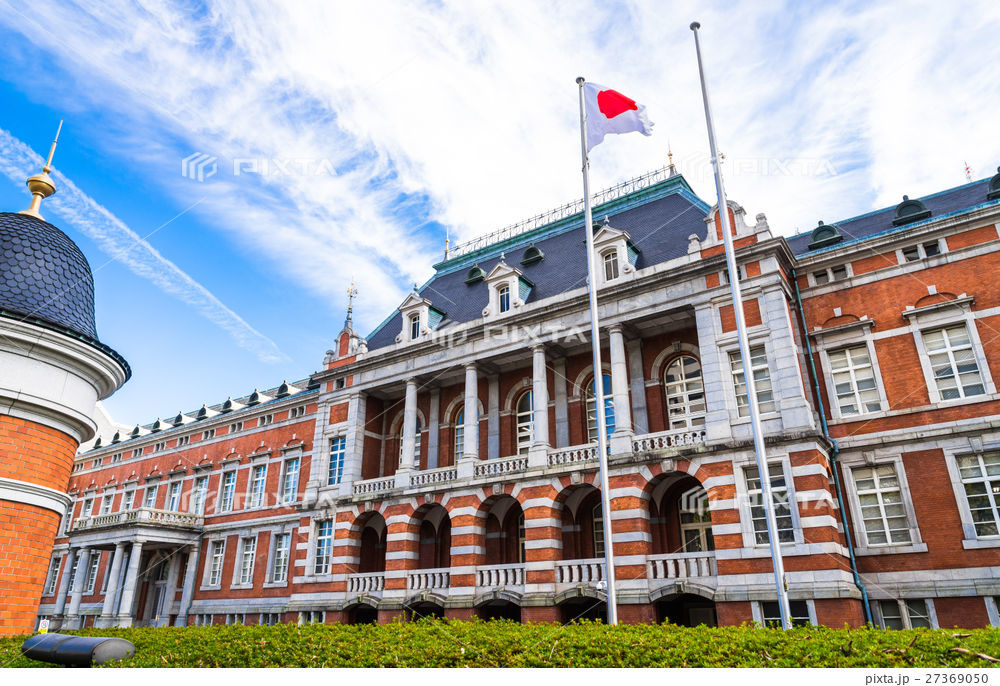
If this article helped you get a basic idea of the process, the next step is to talk with someone familiar with the process, such as a representative at the company you’re applying to or a friend who’s already working in Japan. Getting advice from them should make the entire process much clearer.
Applying for the first time can be stressful, but don’t worry— it’ll all work out in the end! Plenty of others before you have been granted a residence status that allowed them to work in Japan and before you know it, you’ll be one of them!
This Article Was Written Under the Supervision of the IVY Associates Legal Advisors
IVY Associates
“Our primary mission is to help you meet your personal and business goals by providing visa and immigration services.
With nearly 10 years of experience in international law firms and immigration lawyer’s offices, we provide you with the best immigration and business solution.”
“私たちの主な使命は、ビザと入国管理サービスを提供することで、個人およびビジネス上の目標の達成を支援することです。
国際法律事務所と移民弁護士事務所での10年近くの経験を活かし、移民およびビジネスにおける最高のソリューションを提供します。”
Website: https://visaimmigration.jp/
If you want to give feedback on any of our articles, you have an idea that you’d really like to see come to life, or you just have a question on Japan, hit us up on our Facebook!
The information in this article is accurate at the time of publication.
